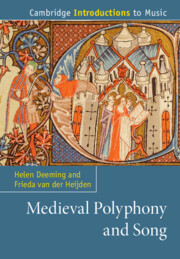Book contents
- Cambridge Introductions to Music
- Medieval Polyphony and Song
- Copyright page
- Dedication
- Contents
- Figures
- Tables
- Boxes
- Music Examples
- Acknowledgements
- Chapter 1 Introduction and Historical Outline
- Chapter 2 Monastic Centres in the Early Middle Ages
- Chapter 3 Court and Cloister in Aquitaine and Occitania
- Chapter 4 Paris: City, Cathedral, and University
- Chapter 5 Courts and Cities in Northern France
- Chapter 6 Scribes, Scholars, and Secretaries in Fourteenth-Century France
- Chapter 7 England after the Norman Conquest
- Chapter 8 On the Shores of the Mediterranean: Italy, Sicily, and the Iberian Peninsula
- Chapter 9 The German- and Dutch-Speaking Lands
- Chapter 10 Medievalisms: Modern Encounters with Medieval Polyphony and Song
- Glossary
- Bibliography
- Discography
- Index
- Cambridge Introductions to Music
- References
Chapter 7 - England after the Norman Conquest
Published online by Cambridge University Press: 27 April 2023
- Cambridge Introductions to Music
- Medieval Polyphony and Song
- Copyright page
- Dedication
- Contents
- Figures
- Tables
- Boxes
- Music Examples
- Acknowledgements
- Chapter 1 Introduction and Historical Outline
- Chapter 2 Monastic Centres in the Early Middle Ages
- Chapter 3 Court and Cloister in Aquitaine and Occitania
- Chapter 4 Paris: City, Cathedral, and University
- Chapter 5 Courts and Cities in Northern France
- Chapter 6 Scribes, Scholars, and Secretaries in Fourteenth-Century France
- Chapter 7 England after the Norman Conquest
- Chapter 8 On the Shores of the Mediterranean: Italy, Sicily, and the Iberian Peninsula
- Chapter 9 The German- and Dutch-Speaking Lands
- Chapter 10 Medievalisms: Modern Encounters with Medieval Polyphony and Song
- Glossary
- Bibliography
- Discography
- Index
- Cambridge Introductions to Music
- References
Summary
Separated from the rest of Europe by the English Channel, yet also linked to it through political and linguistic ties after the Norman Conquest, the musical culture of medieval England displays both connections to and differences from that of its neighbours. Latin song was composed in England and imported from elsewhere, and songs in the vernacular languages of Middle English and Anglo-Norman French also flourished. Songs in all three languages were often compiled together in manuscripts, and some existed in alternative forms, with texts switched to another language. This chapter examines the musical precursors of one of the most famous of all medieval songs, Sumer is icumen in, and shows that the production of polyphony and song in England (as well as Scotland and Wales) was vibrant and distinctive. Surviving pieces from the repertory of Worcester polyphony hint at English composers’ interest in the musical techniques of voice exchange and hocket, but the fragmentary state of many English sources suggests that the losses have been immense. We conclude the chapter with the genre of the English carol, cultivated briefly but fruitfully in the early fifteenth century.
Keywords
- Type
- Chapter
- Information
- Medieval Polyphony and Song , pp. 139 - 159Publisher: Cambridge University PressPrint publication year: 2023

